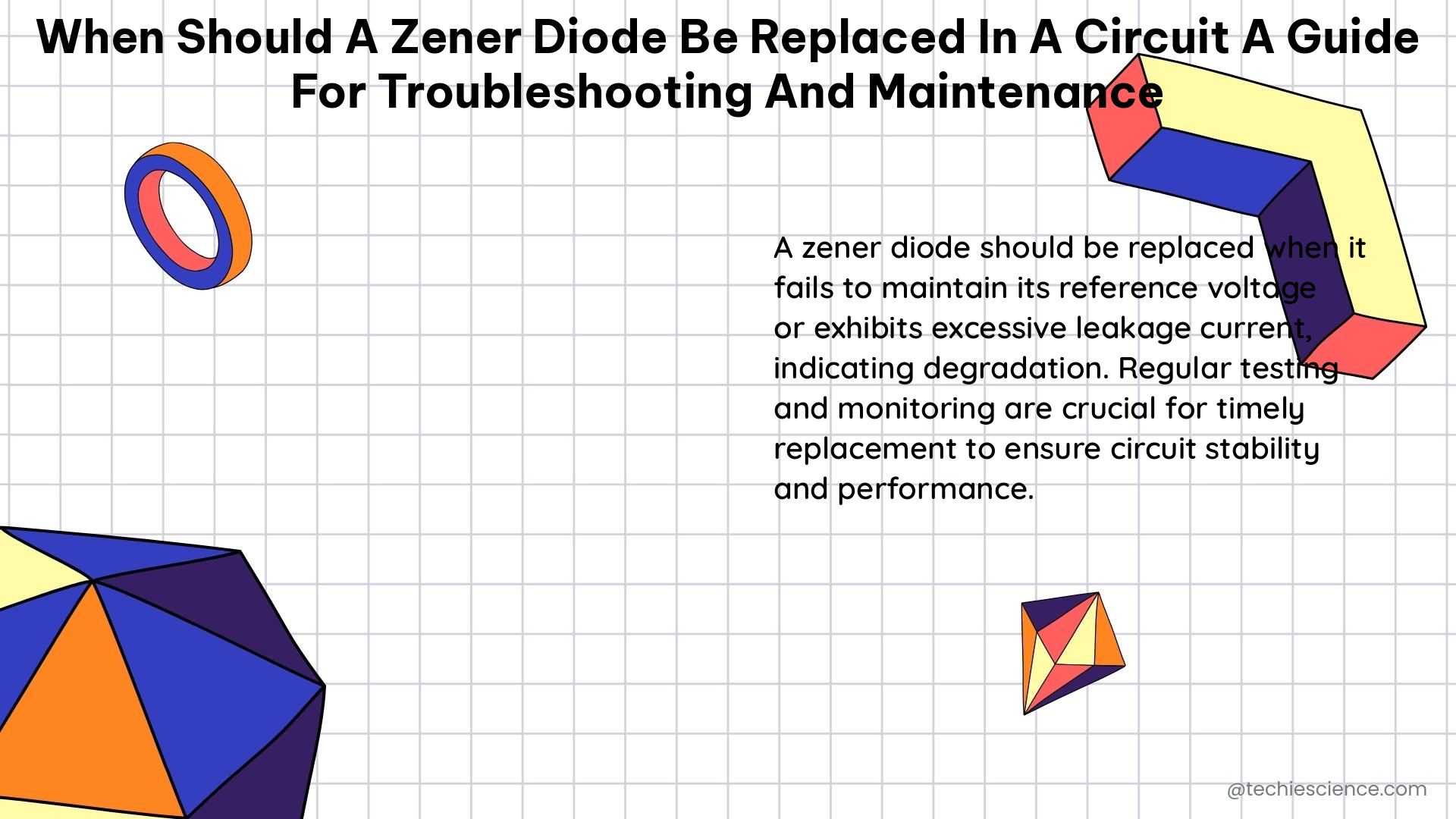Replacing a Zener diode in a circuit is a crucial task that requires a thorough understanding of the diode’s electrical characteristics, operating conditions, and the overall health of the circuit. This comprehensive guide will provide you with a step-by-step approach to troubleshooting and maintaining Zener diodes, ensuring optimal circuit performance.
Identifying the Zener Diode
Before testing or replacing a Zener diode, it is essential to accurately identify the correct type and specifications. The diode should have a clear marking indicating its Zener voltage and power rating. This information is crucial for selecting the appropriate replacement and ensuring compatibility with the circuit.
Measuring the Zener Voltage

To measure the Zener voltage, follow these steps:
- Remove the Zener diode from the circuit.
- Connect the diode in series with a 1 kΩ resistor.
- Use a lab-bench power supply to gradually increase the voltage until the multimeter reading no longer rises.
- The voltage at which the multimeter reading plateaus represents the Zener voltage for the diode.
Ensure that the measured Zener voltage is within the specified tolerance range, typically around ±5% of the rated value.
Checking the Forward Voltage
Use a multimeter set to the diode test mode to measure the forward voltage drop across the Zener diode. For silicon diodes, the voltage drop should be in the range of 0.2 to 0.7 V. If the diode shows an “OL” (open-loop) reading or a voltage drop less than 0.2 V, it is likely faulty and should be replaced.
Testing for Short or Open Circuits
Measure the resistance across the Zener diode using a multimeter. A healthy diode should show a high resistance in one direction (open circuit) and a low resistance in the other (short circuit). If the diode measures as a short circuit in both directions, it is likely damaged and should be replaced.
Checking the Circuit’s Voltage Levels
If the Zener diode is used for voltage regulation, measure the input and output voltages of the circuit. If the output voltage is significantly different from the expected value, the Zener diode may be faulty and require replacement.
Inspecting for Physical Damage
Visually inspect the Zener diode for any signs of physical damage, such as discoloration, burn marks, or cracks. These are indicators of overheating or other issues that may have caused the diode to fail. If the diode appears damaged, it should be replaced.
Considering the Diode’s Age and Operating Conditions
Zener diodes, like other electronic components, have a limited lifespan. If the diode is old or has been subjected to harsh operating conditions, such as high temperatures or voltage spikes, it may be more susceptible to failure and require replacement.
Comparing with the Datasheet
Always compare the measured values of the Zener diode with the specifications provided in the datasheet. If the measured values are significantly different from the datasheet, the diode should be replaced.
Replacement Considerations
When replacing a Zener diode, ensure that the new diode has the same or a compatible Zener voltage and power rating. Additionally, consider the physical dimensions and mounting requirements to ensure a proper fit in the circuit.
Conclusion
By following the steps outlined in this comprehensive guide, you can effectively troubleshoot and maintain Zener diodes in your circuits. Remember to always prioritize safety, use appropriate test equipment, and refer to the manufacturer’s datasheet for specific guidance. By taking a methodical approach, you can ensure the reliable operation of your Zener diode-based circuits.
References
- Electronics Stack Exchange: Zener Diode Not Working as Expected
- Arduino Forum: Help with Zener Diode
- DIYAudio Community: Zener Diode Replacement in Vintage Gear
- Repair Wiki: Diodes – Repair Basics

The lambdageeks.com Core SME Team is a group of experienced subject matter experts from diverse scientific and technical fields including Physics, Chemistry, Technology,Electronics & Electrical Engineering, Automotive, Mechanical Engineering. Our team collaborates to create high-quality, well-researched articles on a wide range of science and technology topics for the lambdageeks.com website.
All Our Senior SME are having more than 7 Years of experience in the respective fields . They are either Working Industry Professionals or assocaited With different Universities. Refer Our Authors Page to get to know About our Core SMEs.